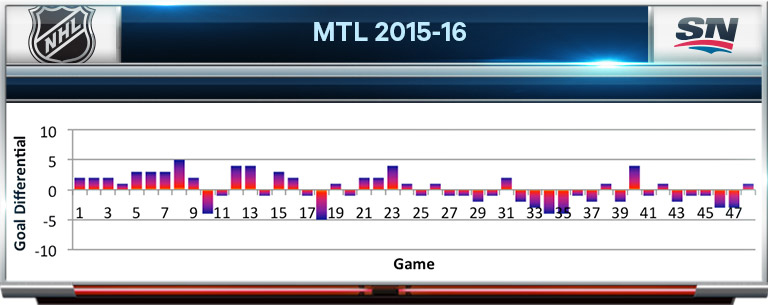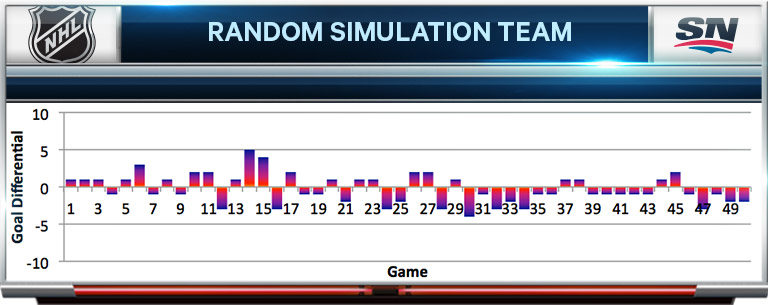The NHL season is a long haul, with many hills and valleys along the way before teams reach their final destination. The process by which games are won and lost can seem to get caught up in bouts of furious momentum where teams streak upward one month and plummet back to earth the next.
The 2015-16 Montreal Canadiens provide an excellent example of this phenomenon. The Habs began the year with a nine-game winning streak, racing out to the top of the Eastern Conference, before grinding to an unexpected halt after Carey Price suffered a long-term injury.
This past Saturday, Montreal registered only its sixth win in the past 24 games, a period in which they’ve experienced distinct losing streaks of four, six and, most recently, five games. They now find themselves out of a playoff spot and hanging on for dear life. Calls for change have grown louder to “fix” what is quickly becoming a lost season while some of Montreal’s stars are in their prime years.
Michel Therrien’s coaching job hangs in the balance, as GM Marc Bergevin tries to deflect blame for the results on the ice.
The reality of professional sports – as with any uncertain outcomes – is that randomness plays a very significant role in the result. Unfortunately, it can be challenging for the casual observer to detect the difference between the streaks we normally expect to occur for a team and a truly unusual outlier performance that deviates from anything we would predict.
Humans seek out explanations for patterns they observe naturally, and we thus strive to find meaning behind winning and losing streaks – even in situations as simple as flipping a coin. Since a coin has a 50/50 chance of turning up as either heads or tails, we tend to assume that a coin toss should alternate between its two equally probable outcomes. Reality shows that while the outcomes will balance in the long term, the path to that result is full of streaks that go one way or the other.
We can see how these sorts of results occur naturally by randomly simulating the outcomes for an imaginary NHL team that wins 44 per cent of its games over the course of a comparable 50-game sample. Our imaginary team has a 22-18-10 record, or 54 points. After the first 17 games of the season, our randomly generated team had a 12-2-3 record for 27 points, which would rank second in the Eastern Conference or first in the Western Conference at that point in the season.
Between games 18 and 29, things balance out a bit and the team comes back to reality by going 6-4-2 over its next 12 games. A randomly generated team now has a record of 18-6-5 after 29 games. That would be 41 points – good enough for a tie for first in the East with Montreal, or second in the West behind Dallas.
Then the wheels fall off for no particular reason. The team goes 4-12-5 over the next 21 games, and drops from a top spot in either conference to 54 points and eighth in the East or sixth in the West – with virtually every other NHL team having games in hand. Our team is clinging to a pretend playoff spot, their imaginary fans are calling for the coach’s head and the GM is falling on his proverbial sword to deflect criticism of the recent performance.
None of the above is actually happening, but it all makes perfect sense given the reactions we see in NHL circles when a team flounders. The problem with assessing any team purely by their record is that the outcomes of games often don’t align with a team’s underlying performance, and the up and down streaks over the course of a season lead to significant overreactions at either end of the spectrum.
Historically, it is quite common for teams to overreact to hot and cold streaks. Middling teams on the playoff bubble trade away prospects or picks to add players at the trade deadline. Think along the lines of last season’s deadline deal by the Penguins to move out top defensive prospect Simon Despres to Anaheim in exchange for “tested” veteran Ben Lovejoy. The Penguins entered the deadline on a four-game winning streak and probably thought better of their chances than they should have.
They closed out the year going 7-10-3 in their final 20 games, barely scraped into the playoffs, and were promptly eliminated by the New York Rangers in five games.
At the opposite end, teams with legitimate hopes of Stanley Cup contention tinker with a solid roster when they hit a rough patch. San Jose traded away Jason Demers and a third-rounder last season in November in exchange for the more defensive Brenden Dillon from Dallas. This was the result of going into a season with high hopes and starting with a 10-9-3 record. Dillon is now playing less than 17 minutes a night for the Sharks and has six points in 47 games, while Demers is averaging more than 20 minutes a night for Dallas and has 16 points through 44 games with the Stars.
THE LESSON
It doesn’t make sense for the majority of NHL teams to get carried away with hot and cold streaks. Streakiness is a naturally occurring phenomenon that results from the randomness of game outcomes for any team in the league.
NHL GMs need to take the long view and wrap their heads around the idea that not all winning streaks mean the team is a Cup contender, and not all losing streaks mean their team is flawed. Riding out the storm can be harder than it looks, but patience is a virtue.











